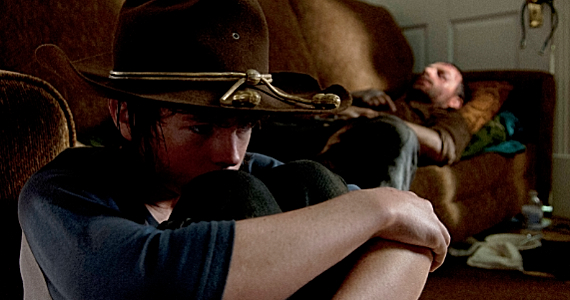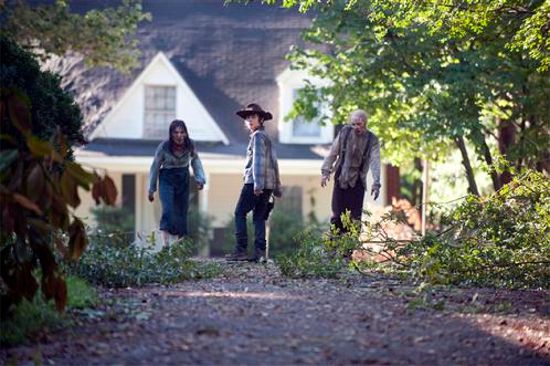
The Walking Dead, Season 4, Episode 9: “After”
Directed by Greg Nicotero
Written by Robert Kirkman
Airs Sundays at 9pm ET on AMC
“Strength is the capacity to break a chocolate bar into four pieces with your bare hands – and then eat just one of the pieces.”
Judith Viorst
After the devastating events at the end of the mid-season finale, which saw the conflict between Rick’s group and the The Governor’s men end in a bloody conclusion, “After” attempts to deal with the fallout from that attack by focusing only on three of the many characters scattered to the wind. In what is a stark contrast to the beginning of season 4, we open with a beautiful ariel shot of the aftermath at the prison. What was once considered a self-sustaining safe haven, now burns to the ground with hordes of walkers invading its premises. No longer are Rick and Carl planting vegetables, nor is Carol teaching the children how to use weapons during reading time. The prison is once and for all destroyed, and as the walkers swarm the grounds, feasting on the insides of a dead horse, the camera pans by the body of a now dead Governor – putting to rest any rumours that he may still be alive. Following the comic book’s story line fairly closely, the episode finds Rick defeated in every way possible. Rick’s declining health makes him more of a liability than an asset, to the point where he spends half the episode in a state of deep and usually prolonged unconsciousness. When he’s unable to take out a Walker with an ax to the head, Carl is left with no choice but to waste a bullet and shoot the Walker down himself; an act that will no doubt come back to haunt him later on. “Save every bullet;” Rick says. Father knows best.
The Walking Dead’s best episodes are those that focus on telling smaller, more intimate stories. And while “After” takes the same three characters who ventured out in the fan/critic-favourite episode titled “Clear,” this time around much of this episode is dedicated to Carl going off … and well… being Carl. Those hoping for a more explosive opener may be disappointed – and Chandler Riggs haters will surely be let down. “After” is essentially a brief coming-of-age tale about a young man rebelling against the seemingly poor decisions made by his father. In what should be a rather powerful moment, Carl lets loose – telling his father everything he’s ever wanted to say but kept bottled up inside. Unfortunately for him, Rick lies unconscious and near dead on the couch. And unfortunately for viewers, we bare witness to Rigg’s ho-hum delivery. If “After” proves anything, it’s that Riggs doesn’t have the range for what the role calls for and shouldn’t be awarded so much screen time, nor so much dialogue. Not to say that none of it works; in one scene Carl evokes the name of Shane while arguing with Rick about how to barricade the door. Its a brief but powerful moment that sums up their current relationship in so few words. In a later scene, we also see a subtle, affecting moment when Carl discovers a video games system. It doesn’t take long before the smile form his face is erased, and he realizes that he must use the television’s power chord to secure the front door and keep the walkers at bay. Carl finds himself caught between wishing he could take comfort in idle pleasures of blissful adolescence and being responsible. Eventually Carl finds a way to bridge the gap between the two – his new pastime is turning his everyday survival into a game he creates, counting score every time he defeats or escapes the clutches of a deadly walker. Scenes like Carl sitting on a roof, enjoying a can of pudding with a walker growling in the background is why I continue to watch The Walking Dead. What makes scenes like this incredibly effective, is that it makes you care about the characters and try to forgot the few moments that don’t quite work.

Kudos to Robert Kirkman and director Greg Nicotero, who serve up a quiet episode without the need of tanks, grenade launchers or cartoonish villains – but while The Walking Dead has improved in storytelling, it still features one major handicap – the show’s reluctant leader Rick Grimes. In what is easily the most ridiculous moment of the entire season so far, Rick looks as if he might have succumbed to his injuries and turned into a walker while lying down on the couch. Is it the direction? Is it the expression on Carl’s face? Is it that the fake-out will never have anyone fooled? Is it Andrew Lincoln’s delivery? Or maybe it is all the above? Whatever the case, the scene does not work and only reminds viewers that the character of Rick Grimes is often flat and lifeless. Maybe it isn’t such a bad idea if he’s removed from the show, once and for all.
Michonne has slowly come out of her shell this season – smiling, talking, laughing and even caring for an infant – and now “After” offers two more moments that allow her character to shine. First we get Michonne’s dreary journey through the woods with her “new pets”. And while the metaphors of Michonne’s fever dream prove a bit heavy-handed, it sure is nice to see her swinging her katana sword and fighting off her depression. Later, in a rare moment of character reveal for Michonne, we are treated to a strange nightmare featuring images of Michonne’s past. In the flashback/half-dream sequence we see her preparing lunch for her lover Mike and his friend, while the three of them discuss art in their luxury condo. While the jump into this world is extremely jarring, the insight into Michonne’s past finally puts a bit of context to her relationship with baby Judith. What exactly does the rest of it mean? We can’t be sure, but “After” at least trusts the audience to draw their own conclusions.

The episode’s most promising, tender and memorable moment comes in the final minute when Michonne knocks at the front door. When Carl asks who it is, Rick replies, “It’s for you.” The show can use more of these happy notes – not to mention moments of calm reflection and humour.
– Ricky D
Other thoughts:
Visually, The Walking Dead always serves up a feast for the eyes. I love the small echoes of the past – a sign on the door that reads “Sam’s Room,” and a note left behind asking someone to end what they couldn’t do.
112 ounces of pudding is a lot.
Carl: “It’s a strong knot. Clove hitch. Shane taught me. Remember him?”
Carl: “I win.”
As Michonne surveys the carnage outside the prison walls, she stumbles across the reanimated head of Hershel Greene (Scott Wilson). She does what is necessary and put Hershel definitely to rest.
Don’t forget to listen to our Walking Dead podcast for more thoughts. New episodes drop every Monday night, with a different special guest each week.

